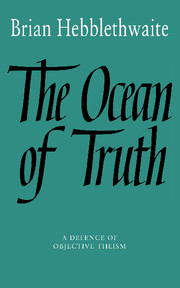Book contents
- Frontmatter
- Contents
- Preface
- 1 Christian belief in God
- 2 The ebbing of theistic faith
- 3 The interiorisation of faith
- 4 Theism in the modern world
- 5 The significance of Kant
- 6 The grounds of theistic belief
- 7 The question of truth
- 8 Religions – theistic and non-theistic
- 9 Life after death
- 10 The Christian Church and objective theism
- Appendix: The Church's ministry
- Notes
- Select bibliography
- Index
3 - The interiorisation of faith
Published online by Cambridge University Press: 06 July 2010
- Frontmatter
- Contents
- Preface
- 1 Christian belief in God
- 2 The ebbing of theistic faith
- 3 The interiorisation of faith
- 4 Theism in the modern world
- 5 The significance of Kant
- 6 The grounds of theistic belief
- 7 The question of truth
- 8 Religions – theistic and non-theistic
- 9 Life after death
- 10 The Christian Church and objective theism
- Appendix: The Church's ministry
- Notes
- Select bibliography
- Index
Summary
The argument of the last chapter was that the various factors which have gone into the making of our modern scientific and critical consciousness, although entailing considerable revision and reformulation of traditional Christian theism, in no way require the abandonment of theistic metaphysics altogether. It is simply not true to say that there is no alternative to a purely interiorised and expressivist understanding of religious language.
In this chapter I turn to an examination of Cupitt's ‘interiorisation’ thesis itself. So far I have characterised it by means of a string of adjectives, mostly taken from Cupitt's writings: subjectivist, anti-metaphysical, non-dogmatic, expressivist, voluntarist, pragmatic, internalised or interiorised. Each of these must now be considered in some detail.
The sense in which this position must be deemed subjectivist is clear. On this view, religion is entirely a product of human subjects. It is not evoked by a response to objective metaphysical realities – in particular the reality of God – over against the human subject. It is not a relational phenomenon, depending on and articulating a real relation between believers and their God. It is rather a matter of purely human ideas, disciplines and aspirations. Of course it is not ‘subjective’ in a purely inward private sense. It is a collective, inter-subjective phenomenon. And it certainly gets expressed in rituals and institutions, which themselves acquire a solidly objective quality in the world.
- Type
- Chapter
- Information
- The Ocean of TruthA Defence of Objective Theism, pp. 35 - 52Publisher: Cambridge University PressPrint publication year: 1988



